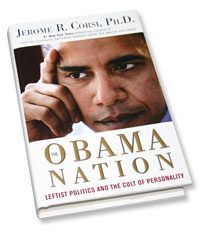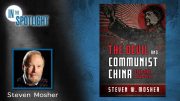
The Obama Nation: Leftist Politics and the Cult of Personality, by Jerome R. Corsi, Ph.D., New York: Threshold Editions, Div. of Simon & Schuster, Inc., 2008, 364 pages, hardcover, $28.00.
When Jerome Corsi’s recent book, The Obama Nation, was released this summer, it began to tarnish Barack Obama’s aura of electoral invincibility that had been the dominant media script up until that time. It was the first widely circulated publication to expose the damaging details about Obama’s past that Obama’s accomplices in the big media knew about, but would not report.
Until this book was published, Obama had been way up in the presidential polls, and his campaign had managed to spin the candidate as a great unifier who transcended race and petty political partisanship. This book started to unmask Obama’s "cult of personality," which subsequent events have accelerated.
Author Jerome Corsi states in the introduction that he wrote the book to keep Obama from being elected, but he is not a Republican partisan and doesn’t plan to vote for McCain. The play on words in the title was deliberate — "Obama Nation" meant Abomination. Having been at the top of the New York Times best-seller list when it was published this summer, and now sitting in the number two slot, it may contribute to achieving Corsi’s goal. Predictably, the corporate media savaged Corsi, but the attacks did not gain much traction or dampen sales.
The Obama campaign was so concerned about its effectiveness that it issued a 40-page rebuttal entitled Unfit for Publication, where it purports to expose Corsi’s "lies." It weakly notes a few obvious typographical errors, such as incorrect dates for the Obamas’ marriage and when they bought their home, and the wrong section of the city where he lived during a stint of "community organizing."
However, the Obama rebuttal failed to effectively challenge Corsi’s most devastating critiques of Obama, including his associations with radical leftists, corrupt money men, hard-boiled Chicago politicians, and venomous racists here and abroad. Nor did it offer reasonable explanations for his intervention on behalf of a leftist Kenyan politician; a questionable house-financing deal with convicted Obama campaign financier Tony Rezko; his longtime attendance at the church of race-baiting Rev. Jeremiah Wright; his sponsorship of the U.N. Global Poverty Act, which would raise world taxes; or his disingenuous campaign statements and techniques. With its nearly 800 footnotes, it is difficult to undermine the book’s major conclusions.
In response, Corsi issued a lengthy surrebuttal on WorldNetDaily.com, based on the "argument from silence." He asserts that Obama’s failure to effectively challenge the majority of his facts and conclusions in Unfit for Publication should stand as tacit agreement that his allegations are true.
Obama Nation contains three parts: an extensive history of Obama’s American, African, and Indonesian roots as set out in his autobiography, Dreams From My Father; an exploration of the origin of his radicalism and the political friends with whom he associates; and finally, an exposé of the strategy and political machinations behind his campaign for president.
Corsi’s critique of Dreams From My Father shows that Obama fictionalized and intermingled the timing of many of the details of his past, so that the events of his early years cannot be easily discerned. For example, Obama’s three trips to Africa as an adult are all merged into a dreamy sequence in the book as though it was only one trip, and fictionalized conversations with family and friends are recounted. As Obama’s mother was white and his father native Kenyan, Corsi recounts, Obama struggled with his self-image before eventually settling on his identity as primarily African.
Corsi next tackles Obama’s longtime associations with radical political friends and ethically questionable associates in Chicago. These include the radical Weather Underground bombers Bill Ayers and Bernadette Dohrn, racist pastor Rev. Jeremiah Wright, jailed campaign finance honcho Antoin "Tony" Rezko, and many others.
Finally, Corsi opens the lid on the Obama presidential campaign, revealing the cynical decision to run Obama as a cult figure and avoid taking positions on issues. That strategy might have propelled him through the remainder of the campaign, had Corsi not come along and exposed it.
Corsi’s book is somewhat plodding, written in the style of a researcher, but is nonetheless interesting due to the bombshell revelations about Obama contained in it. The positive response of liberty-minded people to the book and the angry reaction of the Obama camp and the dominant media show that the facts that he has unearthed have hit their target.



